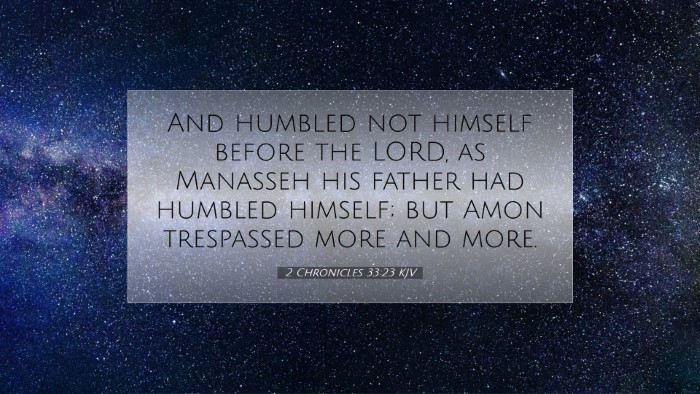Commentary on 2 Chronicles 33:23
2 Chronicles 33:23 states: "And humbled not himself before the Lord, as Manasseh his father had humbled himself; but Amon trespassed more and more." This verse serves as a significant reflection on the nature of spiritual humility and the consequences of pride and rebellion against God. Below, we explore insights from several public domain commentaries to unravel its depth and application.
Contextual Background
The historical context of 2 Chronicles 33 highlights the reign of King Amon of Judah, who succeeded his father, Manasseh. Unlike his father, who experienced a profound transformation and repentance after a period of extreme sinfulness, Amon followed a path of continual disobedience and hubris.
Matthew Henry's Commentary
Matthew Henry emphasizes the tragic failure of Amon to learn from the exemplary humility of his father. He notes:
- Inheritances of Faith: Amon had the opportunity to observe and benefit from Manasseh’s return to God after his deep repentance (2 Chronicles 33:12-13), yet he chose to reject that legacy.
- Continued Sinfulness: Amon’s actions provoke the Lord's anger as he leads Judah into sin rather than reform. Henry asserts that a lack of humility before God often leads to more profound transgressions.
- Consequences of Pride: Henry points out that pride is often a precursor to downfall; Amon's refusal to humble himself marked the beginning of his moral and spiritual decay.
Albert Barnes' Commentary
Barnes provides a detailed examination of Amon’s sin and its implications:
- Non-Humility: He explains that Amon’s failure to humble himself before the Lord was not simply a matter of personal pride but constituted a direct rejection of the covenant relationship Israel had with God.
- More Trespassing: Barnes notes the repetition of sin in Amon’s life; he transgressed more and more, which illustrates a hardening of the heart against divine correction and guidance.
- Judgment and Leadership: Amon’s reign is characterized by oppression and continued idolatry, providing a cautionary tale for leaders who disregard their moral responsibilities and the call to lead their people back to God’s ways.
Adam Clarke's Commentary
Clarke adds further depth, particularly regarding the characteristics of Amon’s reign:
- Idolatrous Practices: Amon not only refused the humility that his father exhibited but further entrenched himself in the idolatrous practices that had once led the nation astray. Clarke notes that this decision directly resulted in a decline in divine favor.
- Legacy of Rebellion: The stark contrast between Amon and Manasseh serves as a reminder of the importance of legacy; Clarke argues that Amon’s choices impacted the generational trajectory of Judah’s faithfulness.
- Spiritual Decline: Engaging in sinful practices to the point of hardness signifies the spiritual decline that often accompanies unchecked power and pride.
Theological Implications
This verse compels pastors, students, and theologians to consider several profound theological implications:
- The Nature of True Humility: Amon's example highlights that true humility is not merely an external action but an internal disposition toward God.
- Role of Leadership and Influence: The spiritual state of a community or nation often reflects the leadership. Amon represents a cautionary narrative for those in positions of power.
- Human Responsibility: The consequence of personal choice in relation to divine sovereignty is profound in Amon's case. His refusal to humble himself resulted in his demise and the suffering of his people.
- Judgment in Rebellion: God’s judgment is both a warning and a call to repentance. Amon's path emphasizes the necessity for leaders to model humility and righteousness to avoid divine retribution.
Conclusion
In summary, 2 Chronicles 33:23 reflects the critical need for humility in our relationship with the Lord. It invites believers to examine their lives in light of Amon's tragic example - a once-promising legacy lost to the depths of pride and disobedience. The insights garnered from Matthew Henry, Albert Barnes, and Adam Clarke serve as a rich reservoir of understanding, encouraging a posture of humility and repentance in the lives of both leaders and followers of God. It is an exhortation to learn from the failures of others and to earnestly seek the grace to walk in alignment with God's will.


